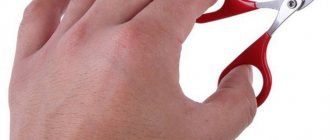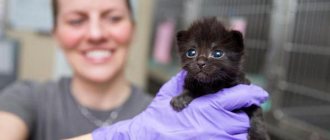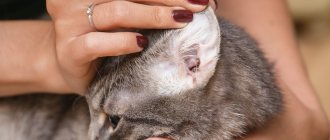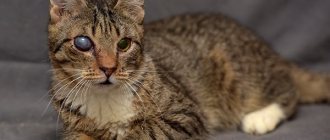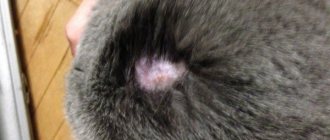On the Internet you can see many funny videos about how different cats react to valerian. For fun, some owners give this medicine to their pets. Many cats who taste valerian immediately become inadequate, which gives their owners a sea of positive emotions. But how does this treasured liquid affect the animal’s body? Later in the article we will talk about exactly this.
Valerian, driving you crazy
Having thoroughly studied the nervous system and physical structure of the cat, scientists came to surprising conclusions. It turns out that valerian contains an odor very similar in composition to the pheromones that are found in the urine of a sexually mature adult cat. This plant stimulates the hormonal and emotional background, changing it. Since valerian has a strong effect on the central nervous system of quadrupeds, it changes the animal's perception of reality. As a result, cats begin to behave unpredictably.
Cats' reaction to valerian
The stimulating effect of valerian on a cat has long been noticed by people. As soon as you bring the lid of the jar containing the medicine to the animal’s nose, he will instantly grab onto it and lick it , without letting anyone in or giving it away.
And only after that he will begin to behave strangely. The effect of the medicine will wear off in 10–15 minutes. After this, the cat will go about its business as if nothing had happened.
Why do cats react this way to valerian? There are several reasons:
- Cats are addicted to certain plants. This list also includes valerian.
- Valerian in its smell reminds cats of the smell of cat hormones. This explains that the medicinal plant only affects cats.
Based on this, valerian should not be given to cats , since it serves as a kind of drug for animals. And in the future, such use will also lead to the fact that the animal becomes lethargic, constantly feels unwell, and various diseases appear. There are cases where even the death of an animal occurred.
Is it possible to give a cat valerian, which comes in tablets?
It is known that valerian tablets are a stronger and more dangerous remedy compared to drops. This is due to the fact that the composition of the drug in tablets is changed compared to the composition found in drops.
So, the tablets contain a quarter of valerian, and the rest are synthetic excipients that can cause allergies.
If, nevertheless, you had to give the cat several tablets, and now he sleeps all the time, then you need to immediately consult a doctor or even take him to the clinic as soon as possible.
What happens to a cat who takes a dose of valerian?
A few minutes after taking the “exciting medicine,” a calm domestic cat turns into a restless bully. Each cat's behavior may vary. But don’t be surprised to see your four-legged furry howling, endlessly rolling on the floor, greedily tearing curtains and wallpaper, and also peeing in the corners.
Valerian is a drug for cats. It can provoke various hallucinations in the animal. The cat can attack an imaginary enemy or run away from a predator pursuing it.
Is valerian harmful for a cat?
If we talk about the dangers or benefits of valerian, then it is worth listening to the opinion of veterinary specialists who urge cat owners not to give valerian to cats for fun. An overdose of valerian-based drugs can cause:
- increased salivation;
- convulsions;
- foam at the mouth;
- clouding of consciousness;
- stroke;
- stopping breathing.
Some animals, after extreme excitement caused by valerian, fall into a long, uninterrupted sleep. In some cases, irreversible inhibition processes develop in the cerebral cortex.
All these symptoms are evidence of the adverse effects of the drug on the cat’s body. Some individuals cannot withstand such a powerful blow to the nervous system, which leads to death.
Consequences
Cats can very easily be “hooked” on valerian, because they are partial to it, just as alcoholics are partial to alcohol. Everyone knows that valerian root is infused with spirit. Since cats have no resistance to alcohol, they can quickly become drunk.
Before pouring a dose of “alcohol” into your pet, you should think about how alcohol affects the human body. It turns out that under the influence of valerian, the cat’s body is very quickly destroyed. In the near future, you can expect the following consequences of the fun:
- stomach ulcer;
- renal failure;
- inhibition of actions;
- liver diseases.
What happens if you give a cat valerian?
Although it is common to think that all cats react to valerian the same, this is not at all the case. Many cats and even more cats do not react to its smell. There are also cats that it scares away. Even small kittens do not like the smell of valerian. But still, for the majority it evokes a very strong feeling - euphoria. However, different cats react to the smell of valerian differently.
Some get extremely excited, rush around the house, climb to the ceiling and perform acrobatic pirouettes. Others literally stick to the place where the smell is strongest, rub against this place, sometimes make strange sounds, and arch their whole body.
But valerian can also have a calming, or rather soporific, effect on cats. Having inhaled the special substances contained in the rhizome and preparations made from it, the cat first gets excited, but soon falls into a deep sleep.
How does a cat react to the smell of valerian?
Any of the felines is not indifferent to this plant. The effect of valerian on cats of any size is the same, only the dosage required to manifest an “intoxicated” state in the animal differs. A small amount of valerian is enough to make pumas jump and lions to show unusual hyperactivity.
What can we say about small domestic cats? They react even to the faint smell of valerian nearby. If your pet goes outside and encounters a valerian plant while walking, it will certainly dig up the roots and begin chewing them. There are facts of furry drug addicts infiltrating warehouses of pharmacies and pharmaceutical factories. And pets can easily find the hidden valerian in the apartment and will use all their strength and dexterity to get the treasured item.
Having received what he wants, the cat goes through several stages indicating drug intoxication:
- Pupil dilation;
- An incredible desire to take a dose of this substance (the cat rubs against the bottle or the place where the infusion was spilled);
- The pet meows strangely;
- Cuddles and rolls on the floor;
- Euphoric state;
- Deep dream.
The influence of valerian on cats is so strong that the pet will stop at nothing, all obstacles will seem insignificant to him, so it is not uncommon for cats to fall from great heights in search of this remedy.
Symptoms of VSD in the acute stage
The cardiovascular symptom complex in VSD is manifested by the following symptoms:
- changes in heart rate;
- lability of blood pressure;
- pathological vasomotor reactions (redness, cyanosis, pallor of the skin, hot flashes, chilliness of the feet and hands).
In the acute stage, burning, stabbing, pressing, throbbing pain or discomfort in the heart area is observed.
The respiratory symptom complex is manifested by increased ventilation (rapid deep breathing), psychogenic shortness of breath (sniffling, yawning, coughing, periodic deep breaths). Hyperventilation always accompanies anxiety. Shortness of breath is accompanied by dissatisfaction with inhalation, a feeling of lack of air, intermittent breathing, and a feeling of stopping breathing. In the acute stage, muscle spasms and a crawling sensation around the mouth and in the distal limbs occur. Neurologists define Chvostek's symptom - contraction of the muscle that raises the corner of the mouth when tapped in the projection of the facial nerve. Hyperventilation may cause the following symptoms:
- headache;
- fainting state;
- pain in the heart area;
- heart rhythm disturbance;
- abdominal pain, combined with increased peristalsis, nausea, and belching of air.
The gastrointestinal symptom complex is characterized by a disorder of the functions of the digestive organs. May exhibit the following symptoms:
- disturbances of appetite, motility of the esophagus, stomach or intestines;
- psychogenic dysphagia (difficulty, discomfort during the act of swallowing or the inability to take a sip);
- vomiting;
- feeling of heaviness in the epigastrium;
- transient flatulence (bloating);
- diarrhea;
- pain in the abdominal cavity.
The thermoregulatory symptom complex is manifested by an increase or decrease in temperature, chill syndrome. The vasomotor symptom complex consists of several symptoms:
- pallor, cyanosis of the skin;
- chilliness of hands, feet;
- sensations of hot or cold flashes;
- changes in dermographism (weak mechanical irritation of the skin when carried out with a blunt object causes a trace in the form of inflamed swelling);
- increased sweating of the palms and feet.
The genitourinary complex is characterized by cystalgia (frequent, painful, imperative urination in the absence of pathology of the urinary system or changes in urine) and sexual dysfunction (impaired erection or ejaculation in men, vaginismus or anorgasmia in women with preserved or reduced libido, painful menstruation). Hormonal fluctuations, including endocrine changes in the body after childbirth, and postpartum stress provoke an exacerbation of VSD symptoms.
The neurotic symptom complex is manifested by the following symptoms:
- fatigue;
- asthenia;
- low threshold of pain sensitivity;
- sleep disorders;
- irritability;
- senestopathies (pain in the heart, a feeling of dissatisfaction with inhalation, a burning sensation in different parts of the body).
VSD occurs with a wave-like increase and decrease in the manifestations of symptom complexes. This is due to changes in etiological factors and living conditions of the patient. An exacerbation of VSD may occur in the fall. Symptoms of the disease are most pronounced during a “vegetative storm” or crisis.
Why do cats love valerian?
According to veterinarians, the reason lies in the special reaction of the nervous system of cats to one of the components present in this plant - actinidin. Because of it, a seemingly harmless plant becomes a real drug for these pets. This reaction occurs at the genetic level, which is why cats cannot resist the smell of valerian. If they use it frequently, they can become truly addicted.
There are three theories to explain the unusual effect of actinidin on cats:
- According to the first, this substance is similar in structure to cat sex pheromones produced during the mating season. This theory is confirmed by the fact that kittens, like castrated cats, are indifferent to the smell of valerian.
- Another theory is that actinidin, combined with other essential oils found in valerian, is a natural drug for felines. Therefore, cats, having sensed valerian, completely ignore all other needs, wanting to get into euphoria as soon as possible.
- A third version says that cats seek out valerian when they are in pain. It is known that the root of this plant has a sedative effect and can cause an analgesic effect. And even representatives of the wild cat family are looking for valerian root to help themselves cope with various ailments. By the way, only this hypothesis has scientific confirmation.
Is it possible to pamper cats with valerian without harm to their health?
Some breeders offer valerian tincture to their pet just like that - thinking that they are giving the animal pleasure. But not every one of them wonders whether it is possible to give valerian to a cat. But in fact, this extract can be harmful.
This drug is not dangerous for the human body, of course, in reasonable doses. Since time immemorial, valerian root has been used by traditional healers to make healing potions that can help improve sleep, calm nerves and relieve stress. But with cats, things are completely different, so giving this medicine to an animal for pleasure is completely unwise.
If there is a need to treat your pet with valerian, it is better to use for this purpose not concentrated pharmacy tinctures, but fresh or dried roots of the plant grown at home.
The content of the active substance in the roots is relatively small, but cats get no less pleasure from eating valerian roots than from tinctures. The degree of intoxication and negative consequences for cats from eating the roots are many times less than from alcohol tincture.
You can also treat your pet with tablets from a veterinary pharmacy. They contain only 1.5% of the main active ingredient, and the rest are auxiliary components of synthetic origin. By the way, the latter can cause allergies.
How much valerian can you give a cat? Only an experienced veterinarian can determine the possibility of taking any drug. Remember that animals react differently to this remedy, and a pet can die from even a couple of drops of extract!
Valerian can be replaced with catnip. Its active ingredient, nepetalactone, also causes euphoria in cats. Once they get to the catnip, cats sniff the plant, after which they roll on the floor, and sometimes even fall into a stupor. It is curious that, as in the case of valerian, some cats are completely indifferent to catnip. Perhaps this is due to the individual characteristics of the animal’s nervous system, and this is rather an exception to the rule.
Valerian has no effect on a third of cats. Possible causes: heredity, genetic disorders, poor sense of smell, lack of personal sensitivity and other conditions. For example, representatives of the Siamese breed do not pay attention to valerian at all.
In what cases can you give valerian to cats?
Despite all the negative effects on the body of cats, valerian is considered a medicinal plant, and veterinarians can prescribe it to cats.
Valerian extract is used in complex therapy of gastrointestinal diseases, heart and thyroid diseases.
Important: do not self-medicate, do not take on faith recipes based on cat grass that can be found on the Internet - this can end in disaster.
The only valerian that is not harmful is the one you give to your animals as prescribed by a doctor if there are medical indications.
Important: strictly adhere to the dosage.
Valerian as a medicine
However, valerian does not always bring only harm. Sometimes it can be used for medicinal purposes, for example, for :
- Heart failure;
- Spasms in the stomach and intestines;
- Digestive problems;
- Excessive passivity of the cat.
Remember that you cannot prescribe medicine to your cat yourself. The benefits of taking valerian are much less than the harm. Before use (regardless of the diagnosis), consultation with a veterinarian is necessary.
© shutterstock
What is valerian
This perennial grows in swamps and lowlands, has a stem almost two meters thick, topped with inconspicuous inflorescences of umbrellas. In medicine and industry in general, only the rhizomes of the plant are used, which are short, loose and branched.
It is in them that the substances that drive cats into a crazy state are concentrated, namely:
- valepotriates;
- formic and other acids;
- glycosides;
- free amines;
- isovaleric acid.
When thinking about whether you can give your cat valerian, remember that the last substance on the list can cause severe burns to the intestinal mucosa and esophagus. But this is just one of the problems.

